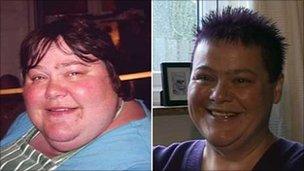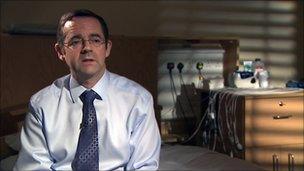'Tidal wave' of sleep disorders
- Published
An expert says the NHS is struggling with sleep disorders related to obesity with more new cases of sleep apnoea being diagnosed
The NHS is struggling with a "tidal wave" of sleep disorders related to obesity, according to specialists.
The number of people being referred for sleep problems in Scotland has risen 25% over the past three years, with about 80% of patients overweight.
Figures for the rest of the UK are not available but doctors at sleep clinics in Scotland say their experience is probably mirrored elsewhere.
Diane MacLean from Dumfriesshire was diagnosed after she stopped breathing during a stay in hospital.
She said: "I woke up with lots of things going on around about me, in an intensive care unit.
"It was pretty serious. I was discharged home with a CPAP (continuous positive airway pressure) machine which I used when I went to bed. There was an immediate effect. I had far better sleep."
Stop breathing
The shock of her hospital experience prompted 28st (177.8kg) Diane to lose weight.

Diane MacLean lost 13st and her sleep apnoea disappeared
She has lost 13st over the past year and her sleep apnoea has disappeared.
Ms MacLean said: "My sleep apnoea has completely cured itself and I no longer snore... or if I do it's not very loud and not for very long."
It is estimated 2% of the population have sleep apnoea - a problem linked to the shape of the throat.
Sufferers suck their airway closed as they relax during sleep, causing them to stop breathing and constantly wake up.
Excess weight around the neck can cause the condition, or make existing symptoms far worse.
For some, the consequences are more serious than a bad night's rest.
There have been cases where sufferers have fallen asleep while driving, causing fatal car crashes.
The DVLA estimates 20% of serious incidents on major roads are caused by sleepy drivers.

Dr Tom Mackay says he is facing a "tidal wave" of cases
Dr Tom Mackay, an expert in sleep disorders, at the Royal Infirmary of Edinburgh says he is facing a "tidal wave" of cases.
There are now more new cases of sleep apnoea being diagnosed than lung cancer and emphysema combined.
Dr Mackay said: "Over the past five to 10 years we have noticed quite a rise in the number of people being referred to us.
"That rise seems to be accelerating. We are now seeing 2,500 new patients each year.
"We are reaching capacity in terms of what we can cope with, and there is an undoubted link with people's weight."
"For a man, if you've got a collar size of more than about 17.5in (44cm) then that is a marker for too much flesh around your neck.
"That roughly equates to a waist size of about 36in."
Dr Mackay urged anyone who thinks they may be suffering from sleep apnoea to get properly diagnosed.
The DVLA does not usually remove the driving licence of patients who are undergoing treatment.
Meanwhile the British Lung Foundation is so concerned about the steep rise in cases that it has made sleep disorders a priority for action.
It also has an online test to see if people are at risk of sleep apnoea, external and a helpline (08458 50 50 20).
- Published27 July 2011
- Published27 July 2011